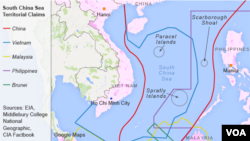China has sent a warning that appears directed at the United States to not engage in what it has called “provocative behavior” in the South China Sea.
The warning followed news reports Thursday that the U.S. military is planning to sail warships close to artificial islands Beijing has been aggressively building in hopes of bolstering its claims in the disputed waters.
According to the reports, U.S. officials have said they are considering sailing warships inside the 12-nautical-mile zones of the artificial islands that Beijing claims are a legitimate extension of its territory within the next two weeks.
Neither the Pentagon nor the White House confirmed the reports. Last month, when U.S. Defense Secretary Ash Carter was speaking about the situation in the South China Sea, he said the United States would, “fly, sail, and operate wherever international law allows, as U.S. forces do all over the world.”
The United States does not recognize China’s territorial claims in the region, which also are contested by the Philippines, Vietnam and other countries.
Responding to a question on the possible U.S. patrols Friday, Foreign Ministry spokeswoman Hua Chunying told reporters that Beijing “will never allow any country to violate China’s territorial waters and airspace in the Spratly Islands, in the name of protecting freedom of navigation and overflight.”
How will China respond?
What actions China might take are not clear. A report in the South China Morning Post Thursday quoted a military source in China as suggesting that Beijing has some "cost-effective" options for such a confrontation such as using drones to ward off ships.
Without directly naming the United States, Hua said China urges “related parties not to take any provocative actions, and genuinely take a responsible stance on regional peace and stability."
In addition to China, the Philippines, Vietnam, Taiwan, Malaysia and Brunei all have overlapping claims in the South China Sea. However, China claims that almost all of the South China Sea is part of its territory and in recent years has constructed seven artificial islands in the Spratly archipelago. The Spratly Islands are located almost directly in the center of those criss-crossing claims.
The United States has said it will not intervene in the ongoing territorial disputes, but will protect freedom of navigation in a region that is critical for international shipping.
Trillions in trade
The South China Sea sees around $5 trillion in trade each year and during his recent trip to the United States, President Xi Jinping said the buildup of the artificial islands was not aimed at any country.
China has said the buildup is more about boosting its ability to contribute to the safety of the waters and provide other services such as weather forecasting and search and rescue support.
However the completion of two airstrips capable of handling military planes, and signs of construction on a third runway, have led the United States and other nations to call on China to halt its “militarization” of the remote outposts that are increasing tensions in the region.






